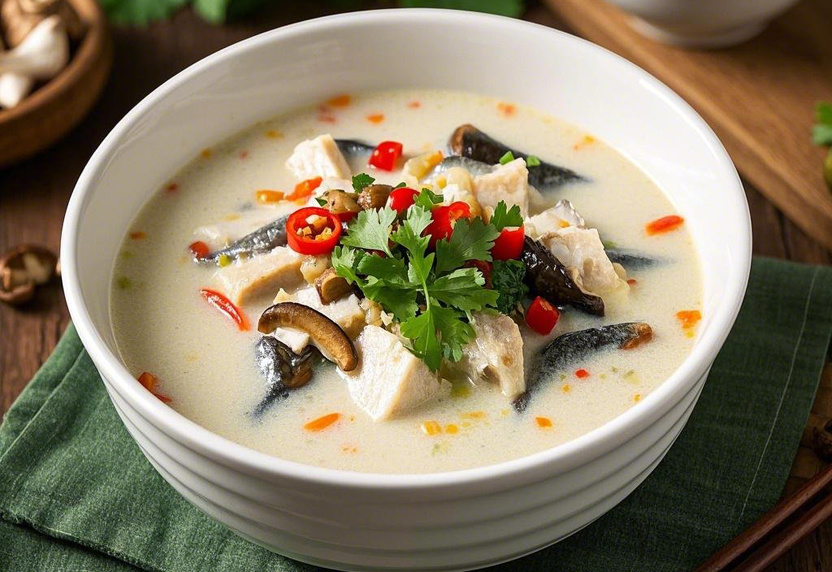Coconut Fish: A Delicious Thai-Inspired Flavor
Today we are going to make a very home-style Thai coconut fish soup. The fish is tender, the coconut milk is richly fragrant, the taste is moderately sour and spicy. The overall taste is rich and delicious. It is an unforgettable delicacy.

 2 Comments
2 Comments
What is coconut fish?
Coconut Fish is a dish that combines fish with coconuts. Usually, coconut milk or coconut meat is used to enhance the flavor. This dish is commonly found in Southeast Asia, especially in traditional cuisines of places like Thailand, Indonesia, and Malaysia. When making it, fish is often simmered with coconut milk and spices to form a rich coconut fragrance. The taste is rich and refreshing.
Ingredients Needed
Salmon: Choose fresh salmon. Its meat is tender and suitable for cooking.
Coconut milk: Provides a rich coconut fragrance and makes the soup more mellow.
Onion: Adds sweetness and aroma to the dish.
Shiitake mushrooms: Add the unique flavor of mushrooms.
Lemongrass: Has a unique lemon aroma and can bring a strong Thai flavor to the dish.
Ginger: Removes fishy smell and enhances fragrance.
Garlic: Enhances the flavor.
Bay leaves: Add aroma.
Fish sauce: Enhances freshness and is a key seasoning for Thai flavor.
Sugar: Balances the taste and adds sweetness.
Common Mistakes to Avoid
Improper handling of salmon
Excessive cleaning: Salmon has tender meat. Excessive cleaning may damage its meat structure, making the fish easily fall apart during cooking. The surface impurities of salmon should be gently rinsed with clean water to avoid long-term soaking or vigorous rubbing.
Inappropriate cutting size: If the salmon pieces are cut too large, it may be difficult for the inside to be seasoned and cooked thoroughly; if cut too small, it is easy to break during cooking. Generally, cutting into pieces about 2 - 3 centimeters thick is more appropriate.
Inadequate handling of lemongrass
Lemongrass is one of the important spices for Thai coconut milk fish. Its outer layer is relatively hard.
If a part of the outer layer is not peeled off or smashed, its fragrance is difficult to be fully released.
The correct way is to cut off the root and top of lemongrass, peel off the harder outer layer, and then gently flatten it with the back of a knife. In this way, the fragrance can be better released during cooking.
Wrong order of adding seasonings
Seasonings such as fish sauce and sugar should be added after the coconut milk and other ingredients have been simmered for a while.
If added too early, the taste of seasonings may become too strong due to long-term simmering and lose balance.
The correct order is to simmer vegetables and spices such as onions and shiitake mushrooms with coconut milk to bring out the fragrance, and then add fish sauce and sugar for seasoning.
Too long or too short simmering time
If the simmering time is too long, the salmon will become dry and lose its tender taste;
If the simmering time is too short, the salmon may not fully absorb the taste of the soup, and vegetables such as shiitake mushrooms and onions may not be cooked thoroughly.
Generally speaking, it is more appropriate to simmer salmon in coconut milk soup for about 10-15 minutes.
INGREDIENTS
MAIN INGREDIENTS
- 300g salmon
- 600ml coconut milk
- 1/4 onion
- 5 mushrooms
ACCESSORIES
- half lemongrass
- some ginger
- some garlic
- 2 bay leaves
SEASONINGS
- half spoon fish sauce
- 1 spoon sugar
- some oil
DIRECTIONS
STEP 1
Shred white onions, slice ginger, mince garlic, quarter shiitake mushrooms, and pound lemongrass.
Then prepare two bay leaves and chop a chili pepper.

STEP 2
Add oil to the pan and fry the mushrooms first until golden and colored, then take them out.

STEP 3
Then stir-fry the ingredients. Add oil to the pan and stir-fry ginger, onions, garlic, and lemongrass.

STEP 4
Directly add 600 ml of coconut juice.
If you don't want the soup to be so thick, you can also add a little water to dilute it.

STEP 5
Add chili peppers and bay leaves.

STEP 6
While the soup is boiling, you can cut the salmon into pieces.

STEP 7
Add the salmon directly to the soup and cook for about 10-15 minutes.

STEP 8
Add the fried shiitake mushrooms and season with half a spoonful of fish sauce and sugar.

STEP 9
Serve on a plate
First take out the salmon and place it at the bottom of the bowl.
Then pour the soup around it. Finally, place bay leaves and coriander for decoration.

More recipes worth trying
CHINESE BRAISED FISH (HONG SHAO YU)
West Lake Fish in Vinegar Gravy recipe
Recipe Variations
1. Ingredient substitutions
Fish selection
Perch has tender meat and few spines, which can bring a different taste to Thai coconut milk fish. Compared to salmon, perch has firmer meat and is not easy to fall apart after simmering.
Tilapia has a unique flavor. It can absorb the taste of coconut milk and spices during cooking and is suitable for people who like softer meat and delicate texture.
Vegetable combinations
Broccoli is rich in vitamins and fiber, which can add rich colors and nutrition to the dish. In Thai coconut milk fish, broccoli can be added in the last few minutes of simmering to maintain its crisp and tender texture.
Spinach can add a refreshing taste and rich nutrition to Thai coconut milk fish. It can be added when the simmering is almost over and cooked until slightly soft.
2. Flavor changes
Curry powder: Adding curry powder can enhance the flavor of Thai coconut milk fish and make it have a rich curry aroma. Add 1-2 teaspoons of curry powder during simmering and adjust the dosage according to personal taste.
Lemon leaves have a unique fragrance and can add a fresh taste to coconut milk fish. Add 2-3 lemon leaves during simmering to enhance the overall flavor.
3. Cooking methods
Oven baking:
Put salmon pieces in the oven and bake at 180-200℃ for 10-15 minutes until the surface is golden. After baking, add coconut milk and other ingredients for simmering, which can make the surface of the fish more crispy.
Stir-frying:
Fry the salmon pieces until golden on both sides, then add onions, shiitake mushrooms and other vegetables and stir-fry evenly, then add coconut milk for simmering. Stir-frying can make the surface of the fish more crispy and increase the fragrance of vegetables.
4. Matching staple foods
Fragrant rice: Fragrant rice has a unique aroma and goes well with Thai coconut milk fish. Fragrant rice can absorb the taste of coconut milk soup and make the rice more delicious.
Udon noodles: Udon noodles have a chewy texture. Matching with Thai coconut milk fish can increase the richness of texture. Udon noodles can be added during simmering and cooked with fish and vegetables.
Recipe analyzer
- Recipes: Coconut Fish: A Delicious Thai-Inspired Flavor
- Main Ingredients:8
- Servings per recipe:1
- Servings size:1.1 kg
-
Energy (calories):1891 kcal
-
Protein:78.92 g
-
Fat:167.03 g
Why gray?

-
Carbohydrates:39.24 g
-
Protein: 17%321 kcal
-
Fat: 75%1412 kcal
-
Carbohydrates: 8%157 kcal

The ratio shows whether the proportion of both fatty acids in your diet is optimal. Red color means too much of Omega 6 or too little of Omega 3. The data are rounded off and approximate.







2 REVIEWS